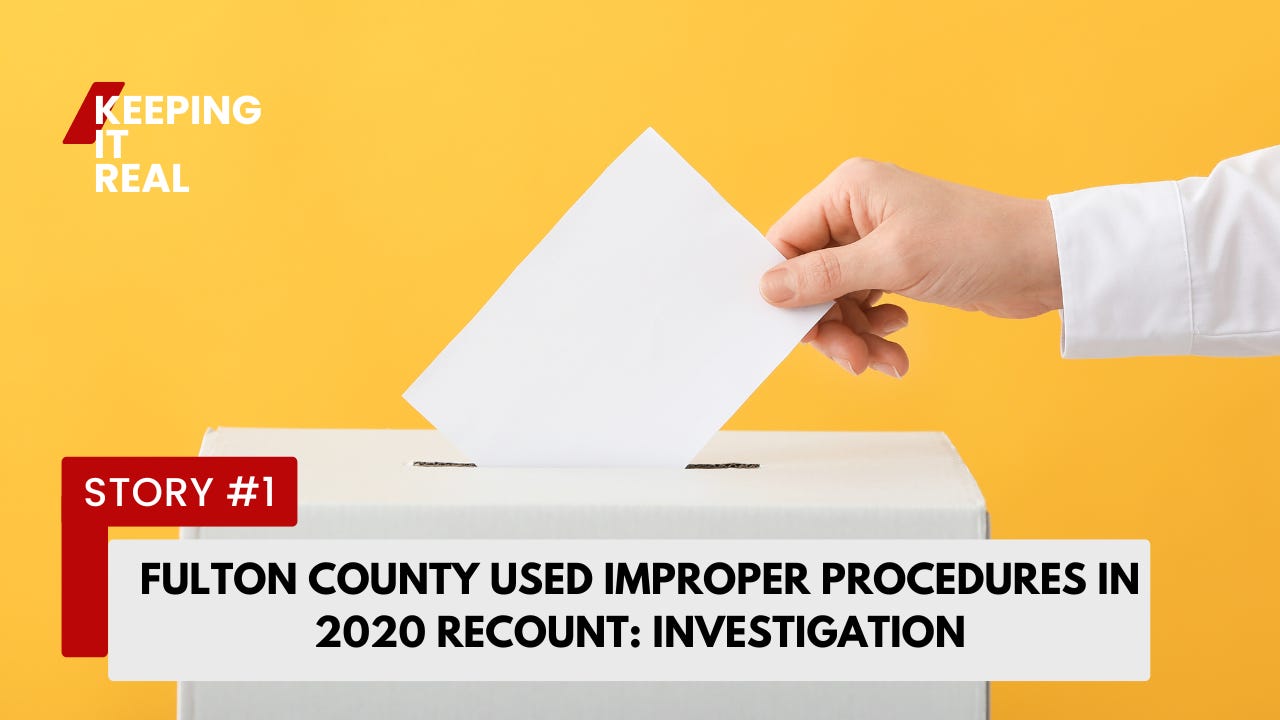Please support my independent journalism by ensuring I can send this free newsletter every morning. It’s $5 a month, and you can quit anytime. I walked away from a high-paying job in the MSM to go independent. If you haven’t already done so, please do so.


ATLANTA, Ga. - The Georgia secretary of state’s office has determined Fulton County used improper procedures during its 2020 presidential election recount.
During a Georgia state elections board meeting on Tuesday, Charlene McGowan, general counsel for the secretary of state’s office, said, “The conclusion of this investigation ... is that Fulton County used improper procedures during the recount of the presidential contest in 2020.”
McGowan stressed the investigation’s outcome doesn’t change the election’s overall outcome, an election that saw Joe Biden become the first Democrat since 1992 to carry any deep Southern state on his way to ousting his Oval Office predecessor, Donald Trump.
“This investigation confirmed what we already knew,” McGowan said. “There is nothing we have learned that is new from this investigation.” Click here to read more.

BOSTON, MASS — The Massachusetts Institute of Technology (MIT) announced that faculty candidates will no longer be asked to provide diversity statements during the application process.
Before the switch, which was announced on Monday, faculty candidates were required to “explain how they would enhance the university’s commitment to diversity,” according to the New York Times. “Such statements have become enshrined in faculty hiring at many elite public and private universities, as well as in corporate life. Academics have defended them as necessary in judging whether a faculty member can reach out to an increasingly diverse student body,” added the Times.
MIT President Sally Kornbluth said such statements were just compelled speech and did not help the university achieve its goal of excellence. Click here to read more.

MIDLAND, Mich - Vice President Kamala Harris told a crowd in Detroit during a May 6 campaign stop that Michigan is “killing it in terms of jobs, job creation,” according to MIRS News.
Harris made the comment after encouraging people to apply for fellowships at the U.S. Department of Energy, citing the auto industry’s move to electric vehicles.
Michigan lost 4,200 auto and auto parts manufacturing jobs in the past year, a 2.5% decline, said James Hohman, director of fiscal policy at the Mackinac Center for Public Policy. The rest of the country added 46,500 auto and auto parts jobs, for a 5.4% increase over the same period, he added. Click here to read more.

WASHINGTON D.C. - NEW YORK (AP) — All dogs coming into the U.S. from other countries must be at least 6 months old and microchipped to help prevent the spread of rabies, according to new government rules published Wednesday.
The new rules require vaccination for dogs that have been in countries where rabies is common. The update applies to dogs brought in by breeders or rescue groups as well as pets traveling with their U.S. owners.
This new regulation is going to address the current challenges that we're facing," said Emily Pieracci, a rabies expert at the Centers for Disease Control and Prevention who was involved in drafting the updated regulations.
The CDC posted the new rules in the federal register on Wednesday. They take effect Aug. 1 when a temporary 2021 order expires. That order suspended bringing in dogs from more than 100 countries where rabies is still a problem. Click here to read more.

MADISON, WI - An eighth-grade Wisconsinite is being hailed as a hero after grabbing hold of the wheel of his school bus after the driver lost consciousness.
His heroics have earned him plaudits from the mayor’s office, city council, fire and rescue, and the police department, and the young man has said the incident has made him feel more confident.
It started when Acie Holland III boarded his school bus as per his normal routine in April. He joked with the bus driver for a moment, then she put on some headphones, and the bus rumbled off. The new rules require all dogs entering the U.S. to be at least 6 months, old enough to be vaccinated if required and for the shots to take effect; have a microchip placed under their skin with a code that can be used to verify rabies vaccination; and have completed a new CDC import form. Click here to read more.




















